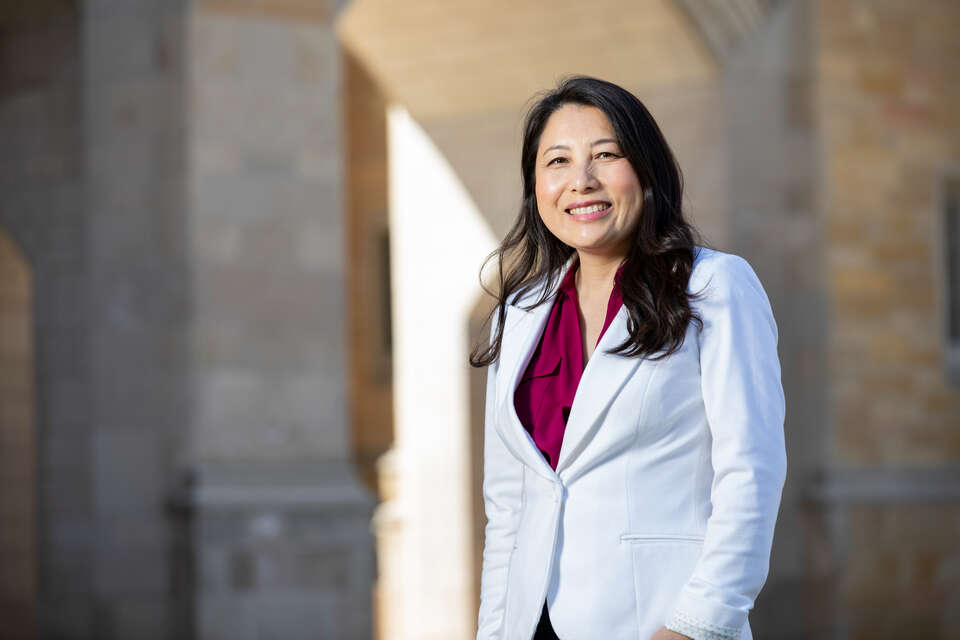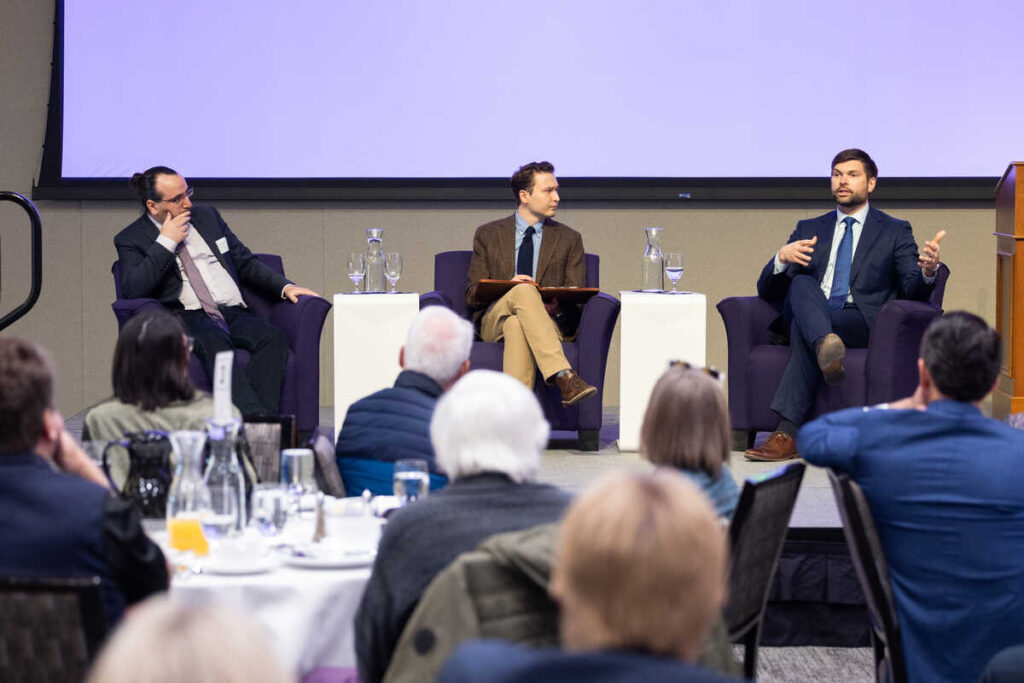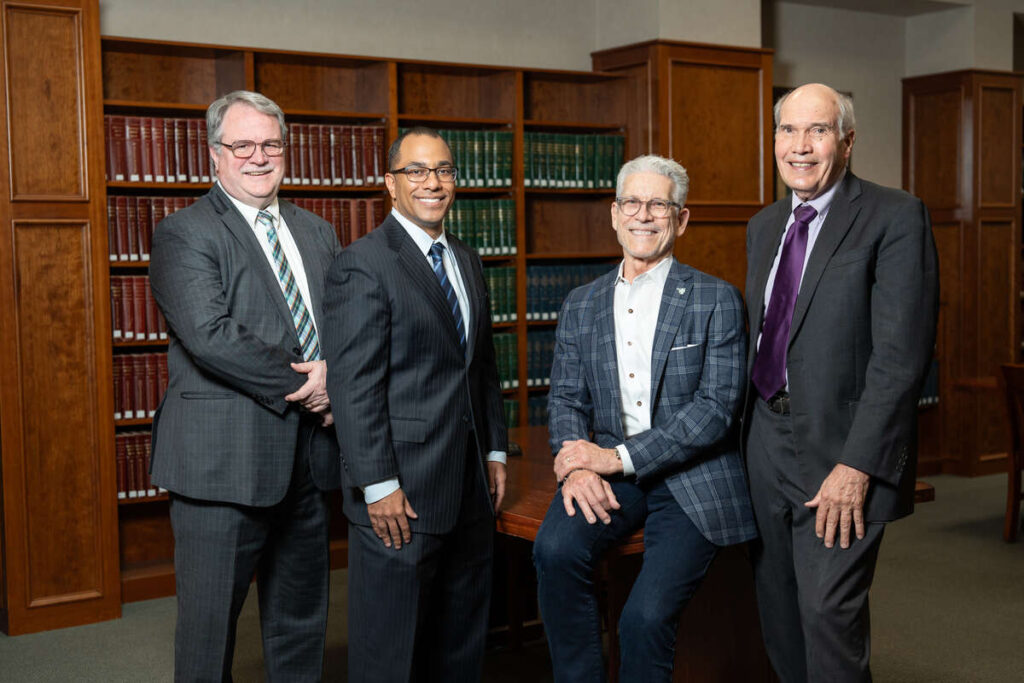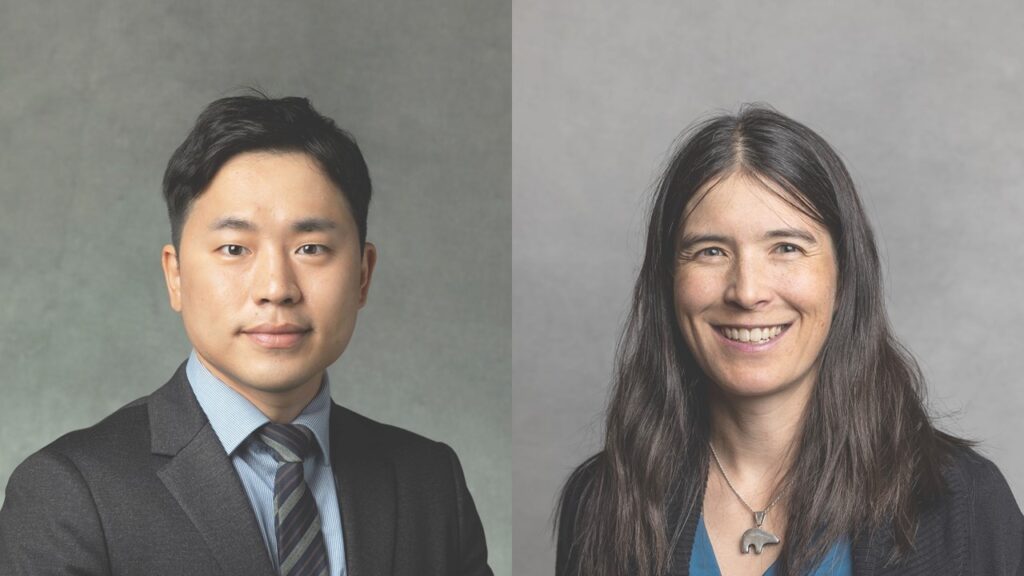The University of St. Thomas community will gather Wednesday, May 9, to celebrate its annual St. Thomas Day and honor recipients of its Humanitarian, Distinguished Alumnus, Professor of the Year, Tommie and Monsignor James Lavin awards.
St. Thomas Day events begin with a 5:30 p.m. Mass in the Chapel of St. Thomas Aquinas. The Mass will be celebrated by Archbishop Harry Flynn, chair of the university’s Board of Trustees. A dinner and awards program will follow in James B. Woulfe Alumni Hall, Anderson Student Center. More than 500 members of the St. Thomas community are expected to attend.
Nominations for the Distinguished Alumnus/Alumna, Humanitarian and Lavin awards are welcome throughout the year but are required by July 1 for consideration for the following year’s St. Thomas Day. For forms and more information on how to submit a nomination, visit the Alumni Association website.
The five St. Thomas Day award recipients are:
Distinguished Alumna Award
Bernadeia Johnson ’93 M.A. will receive this year’s Distinguished Alumna award.
Established in 1971, the Distinguished Alumnus award recognizes leadership and service to the university, to the community and in the person’s field of endeavor.
Johnson, a native of Selma, Ala., said growing up in the segregated south meant “you understood the sacrifices that your community made to make sure that you had an educational experience, because that was the way to be able to come back and support your family and community.”
As superintendent of Minneapolis Public Schools, a role she has held since July 2010, Johnson oversees a $685 million budget, 34,000 students and 5,600 employees. But it is her drive to see through those large numbers and into the lives of each student that reflects the way Johnson approaches her work , and why she was selected for this award. Her vision − steeped in her childhood experiences – for children’s education is boldly, and aptly, displayed on the nameplate on her desk: Every Child. Every Day.
Johnson graduated from Alabama A & M − Huntsville in 1981 with a degree in speech pathology. A gifted clarinetist, she attended university on a full music scholarship, though her motivation to pursue college was as much, if not more, spurred by her strong, education-minded family that expected excellence.
Raised by two parents who both had higher education degrees, Johnson remembers clearly: “It was absolutely understood that I would go to college.”
A deeper look at her family history points to a legacy that prioritized education. Her uncle, Ulysses Blackmon, a teacher, was among the “Courageous Eight,” a group of African-Americans who registered black people to vote shortly after the passage of 1964’s Civil Rights Act. Her maternal grandmother, Hallie Hendrieth-Smith, who lives in Minneapolis and served as an elementary school principal here for three decades, earned a doctorate.
Upon graduation Johnson made a beeline for Minneapolis, the place where she and her two siblings flew to visit their grandparents every summer as children, and got a job at a McDonald’s in north Minneapolis. Her affable personality impressed a regular – a manager at what is now U.S. Bank – and he offered her a job as a bank teller, which she accepted. She eventually was promoted to financial analyst. Thirteen years later, she was laid off − a blessing in disguise she viewed as “the right thing at the right time” and “an opportunity for soul searching.”
The result of that search set her on a steadily escalating trajectory toward a prosperous career in education – a path that began in 1991 in the University of St. Thomas School of Education’s Collaborative Urban Educator program, an alternative teaching licensure program that recruits largely from communities of color. She earned her CUE licensure in 1992 while completing course work at St. Thomas toward an M.A. in curriculum and instruction education (K-12), a degree she earned the following year.
In just more than 20 years, Johnson ascended from entry level to the top ranks of her profession, rising from fifth-grade teacher at St. Paul’s Highwood Hills Elementary School to assistant principal at St. Paul’s Saturn Riverfront Academy to principal at Minneapolis’ Elizabeth Hall Community School (where Hendrieth-Smith also had been principal) to deputy superintendent of Memphis City Schools in Tennessee and, finally, to chief academic officer and later deputy superintendent of Minneapolis Public Schools – roles she had held beginning in 2005 until she was offered the superintendent position in early 2010.
Johnson describes her current job as “a political job, without a doubt,” but she passionately aims “to figure out how … to keep the main thing the main thing, which is to prepare students to be college- and career-ready. … It’s the core mission of this organization.”
Public education is a mission she takes seriously and believes students as well as parents and communities are accountable for students’ success: “It’s our responsibility as adults to set the expectations: ‘When you come to school, you have to come prepared, ready to learn, ready to engage.’ I just can’t accept anything less. I just can’t.”
Humanitarian Award
Dr. Gordon Klatt ’64, founder of Relay For Life, will receive this year’s recipient of the Humanitarian Award.
Established 44 years ago, the Humanitarian Award is presented by the university’s Alumni Association and recognizes those who “better the spiritual and material welfare of the less fortunate."
In 1985 Klatt, an avid marathon runner and colorectal surgeon in Tacoma, Wash., circled a track for 24 consecutive hours by himself “on a whim” to help boost the income of his local American Cancer Society chapter and show support for all of his patients who had battled cancer.
Friends and family donated $25 each for a 30-minute slot to circle the track with him. By the end of his daylong quest, he had run or walked 83 miles and raised $27,000. Three hundred of Klatt’s family, friends and patients, as well as his lone staff member, Carl Jones, supported him that day. “They inspired me to keep going. … Many pitched tents and stayed there,” he said.
Klatt never dreamed his humble effort that began relatively quietly on the University of Puget Sound’s Baker Track would become so widespread and influential. But despite the small beginning, “we saw something special was happening,” he said.
The next year, Klatt, with help from Pat Flynn, known today as the “mother of the relay,” organized a committee for the event – then named the City of Destiny Classic 24-Hour Run Against Cancer − and moved it to Tacoma’s historic, 15,000-seat Stadium Bowl. There, 19 teams participated to raise $33,000.
In 1994, his endeavor evolved into what it is known as today, Relay For Life, the American Cancer Society’s nationwide, premiere event. Now an international event, Relay for Life since has spread from Tacoma to 5,400 communities across the United States and 22 countries, earned more than $4 billion and involved 3.5 million participants since 1985. It is the most successful nonprofit event in the United States.
Relay events involve teams of people who camp out on high schools, fairgrounds or local parks and take turns running or walking around a track or on a path. St. Thomas has hosted a Relay for Life, in conjunction with St. Catherine University, since 2009.
More than a fundraiser, Klatt believes the event “reaches people’s spirits. The community responds to it. It’s a celebration of the lives of the people who have survived cancer and remembering the lives of the people who didn’t make it.”
Klatt, who earned an M.D. from the University of Minnesota Medical School, said the event “represents what a cancer patient has to go through. … because it’s really tough – surgery, chemotherapy, radiation. The event in some way represents that struggle in walking around and spending the whole night on a track. But the camaraderie of the people is what lifts the spirit and raises hope.”
Professor of the Year
As a young girl, Corrine Carvalho thought she would be an archaeologist. Although she did not become the next Indiana Jones, Carvalho held onto her love of ancient subjects, earning a B.A. in Latin from the University of San Francisco and eventually a Ph.D. in the Hebrew Bible and Old Testament from Yale University.
Today, the full professor in St. Thomas’ Theology Department of the College of Arts and Sciences is the 2012 Professor of the Year. The 50-year-old award recognizes excellence in teaching, scholarship and inspiration to students.
Carvalho landed at St. Thomas in 1996, after a five-year stint as an assistant professor, teaching mostly at the graduate level, at Florida State University.
“I decided I would be more comfortable in a faith-based university if I could,” she remembered. She also desired an opportunity to teach undergraduates, noting, “I have always felt a real affinity with undergraduate education, which made me a bit of an oddity in the way I was enculturated as a scholar."
The Twin Cities experienced an incredible ice storm the day Carvalho arrived for her interview at St. Thomas, she remembered. "They thought I wouldn’t make it," Carvahlo said, but she's glad she braved the storm.
“I was very impressed with the Theology 101 class and the textbook that the department had put together. [The faculty] had thought of ‘What do we want to get out of this?’ This place had done the work,” she thought after her interview. She also appreciated the university’s three-course theology requirement and “huge faculty.”
“It’s been great here,” she said. “This is home now.”
Carvalho credits St. Thomas for fulfilling her niche in both teaching and personal scholarship: “I came here to teach undergraduates primarily, and then what I found was that the way the university defined scholarship in the broad sense of the term freed me up to do what I wanted to do,” which includes, most recently, writing projects on temple ideology and ritual studies in application to the Bible; moreover, she views this award as “affirming my experience at St. Thomas.”
Particularly fond of teaching in the core, which includes Theology 101: The Christian Theological Tradition, Carvalho said, “I feel very strongly about the role of religion and theology in thinking about the Bible − that anybody who is an informed citizen of the United States needs to be able to evaluate statements about the Bible in the same way they evaluate statements made about the economy or political candidates.”
At St. Thomas, she discovered that “students were having these incredible conversations in their dorms – about issues related to theology, religion, ethics – but they weren’t having them in the classroom.” So she went about creating a safe environment that would give the “the structure and vocabulary to have those conversations in class.”
Above all, Carvalho enjoys tapping into the “very interesting thoughts about religion and authority” that she knows her students have. It is her hope they will leave her classes with the understanding “that questions about religion and the Bible are important to our culture. … that they don’t just swallow things hook, line and sinker. … that they have the tools to think for themselves on the issues.”
Carvalho also is a freshmen adviser in the Theology Department and a co-adviser for Allies at UST. Additionally she serves on a number of committees at St. Thomas in support of women’s interests and currently is fulfilling the last months of her six-year tenure as director of St. Thomas’ Luann Dummer Center for Women.
A mother to five children and stepchildren ages 14 to 29, she notes that “there are few women in academia who succeed who have children … and that’s sad.” In her experience, “having children, having a family at home, has made me a better scholar. It’s made me more organized. It’s made me focus on work when I’m at work, and focus on family when I’m at home. … they’ve been so supportive. I’m not who I am apart from them.”
Monsignor James Lavin Award
Thomas Cronin has been named recipient of the Monsignor James Lavin Award. Established in 1994, the award annually honors a volunteer for service to the St. Thomas Alumni Association.
A 1964 St. Thomas graduate in accounting, Cronin later received a law degree from William Mitchell College of Law in St. Paul. He is retired from RSM McGladrey Inc., where he was tax partner and managing director.
A self-described “basketball junkie,” Cronin was recruited to play basketball for St. Thomas under then head basketball coach, UST Athletic Hall of Famer Tom Feely.
Cronin’s alumni involvement is extensive and dates back as early as 1990, when he served on committees for STARS Student Recruiting and the Class Bequest Committee.
Most recently, he served on the Alumni Board (2005-2011), serving as the board’s vice president from 2006 to 2008 and the Tommie Club Cabinet (2009-2010). In addition to being inducted into the Society of the Arches in 2010, he has been active with the President’s Council , the Alumni Athletic Association, First Fridays, the Alumni Athletic Association, Tommie Club, Christmas concerts and the William Finn Heritage Society.
Cronin counts his service on the Alumni Board in particular as a significant aspect of his involvement with St. Thomas. He was pleasantly surprised that the board was able “to advise and provide input to the university,” he said. “I thought it would be more removed.” Coming from a family of limited means, Cronin enjoyed playing an active role in getting the board to support endowed scholarships for students.
While he plans to continue supporting St. Thomas, he has had to dial back his involvement after his recent diagnosis of esophageal cancer. Currently undergoing chemotherapy, Cronin gives much credit to his incredible support system of family, friends and doctors.
He admits to having “up and down days,” but is committed to staying positive. “You don’t have much choice about state of mind,” he said. “If I feel terrible, the chemotherapy’s working. If I’m feeling good, I’m feeling good.”
When he learned he had received the Lavin award, Cronin said he was “surprised, humbled.” A former resident of Ireland Hall, Cronin has fond memories of Father Lavin, who was part of the St. Thomas community for seven decades and well known, in part, for his famous “Lavinburgers,” − peanut butter and jelly sandwiches he’d leave out for Ireland Hall residents two nights a week. Though Cronin did not know him well, he always was aware of all the students he helped.
Cronin, a Chicago native, has five children from his marriage to his first wife, who died. His second wife, Linda, has two children.
Tommie Award
Selected from a field of 16 nominees and three finalists, Matthew Sullivan won the 2012 Tommie Award, an 80-year-old honor that anually has been given to a St. Thomas senior who exemplifies the ideals of the university.
Sullivan, who is from Dubuque, Iowa, is majoring in financial management and has a 3.17 grade-point average. He has been involved in many aspects of St. Thomas student life, including Undergraduate Student Government, Student Alumni Council, varsity football, the St. Thomas Budget Advisory Committee and the executive board for Up ’til Dawn.
His parents are Michael and Julie Sullivan of Dubuque, Iowa.
“He has the gift of seeing what is right in people” and “is an exuberant cheerleader of all things Tommie,” wrote Dr. Mary Schmid Daugherty in one of Sullivan’s testimonials for the Tommie Award.
To those who know Sullivan, a football player since seventh grade, it will come as no surprise that both of his favorite inspirational sayings come from legendary Green Bay Packers’ coach Vince Lombardi and reflect his persevering and upbeat character: "The difference between a successful person and others is not a lack of strength, nor a lack of knowledge, but rather a lack of will,” and , "It does not matter how many times you get knocked down, but rather how many times you get up."
Neil McKeown, Sullivan’s friend and also author of one of Sullivan’s testimonials for the Tommie Award, wrote, “Matt’s unshakeable positive attitude has been challenged at times but never broken.”
Sullivan’s spirit was put to the test fall semester of his sophomore year when, during a football scrimmage, he suffered a career-ending knee injury: He tore his ACL, PCL, MCL and meniscus, and fractured his tibial plateau. A football player since seventh grade, Sullivan was devastated. But instead of wallowing on his crutches, he became manager of the football team, thanks to St. Thomas football Glenn Caruso, a role he has held and prized since his accident.
“Not being able to throw on pads and go to practice with the guys was difficult at first,” Sullivan said. “I definitely wanted to be out there running around with them during practices and games. But once I accepted that I would no longer be able to do those things anymore, I realized all of the fun, new things I’d get to do instead of playing.”
With an optimistic approach to his bad stroke of luck, Sullivan quelled his dreams of someday playing quarterback: “As every offensive linemen will admit … we all want to be quarterbacks at some point or … have the opportunity to throw the ball around during practice. … [As head football manager] I didn't have a responsibility to just one area; I was responsible for the whole field. And which position do you think requested my services every now and then? The quarterbacks! So that was a blast being able to warm up with them.” He added, “I still got to experience all of the ups and downs with the guys even though I wasn't able to play anymore.”
One of those “ups” is among his best memories of St. Thomas: Beating St. John’s this season, 63 to 7. Sullivan called it “an absolute blast.”
With the exception of 1945 and 1946, the Tommie Award has been presented annually since 1931 to a senior. It recognizes achievements in scholarship, leadership and campus involvement, and represents the highest ideals of the university. Past recipients can be viewed on the Tommie Award website.
The Tommie winner is selected by a vote of students, staff and faculty. Sponsored by university’s Division of Student Affairs, the award recognizes exceptional scholarship, leadership and campus involvement.






